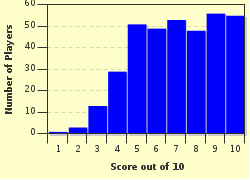Quiz Answer Key and Fun Facts
1. We'll start with the fundamentals of any language: greeting someone. How might you typically greet someone in Afrikaans?
2. Right, the greeting bit is over. However, in polite conversation, it is considered somewhat rude to not ask someone how they are. Which of the following would be the correct way of asking someone this in Afrikaans?
3. Oh dear! Someone is blabbering away wildly in Afrikaans, but you have no idea what they're saying! How would you tell this person that you can't speak their language?
4. You've just been asked "Wat is jou naam?" by an Afrikaans speaking person. What do they want to know?
5. Would the sentence "Wat is die tyd?" be the correct way of asking what the time is in Afrikaans?
6. You're wandering the streets of Jo'burg when you come across a sign on a gate that says "Pasop!" What does this sign mean?
7. You're trying hard to show off your new Afrikaans abilities. However, being a beginner, you need things to be said slowly, and sometimes repeated. Which of these is the politest way to ask someone to repeat themselves for your benefit?
8. You're lost. Thankfully, you manage to find another person, and explain that you need to get back to your hotel. The person that you found can understand English, but can't speak it. They say to you: "Gaan oor die brug, en om die hoek."
What did they just say?
9. An Afrikaans speaking person has just done you a huge favour. Which of the following would be a way of expressing your thanks?
10. Sadly, we have reached the end of the quiz. Which of the following is a typical way of saying goodbye in Afrikaans?
Source: Author
thegogga
This quiz was reviewed by FunTrivia editor
Bruyere before going online.
Any errors found in FunTrivia content are routinely corrected through our feedback system.

